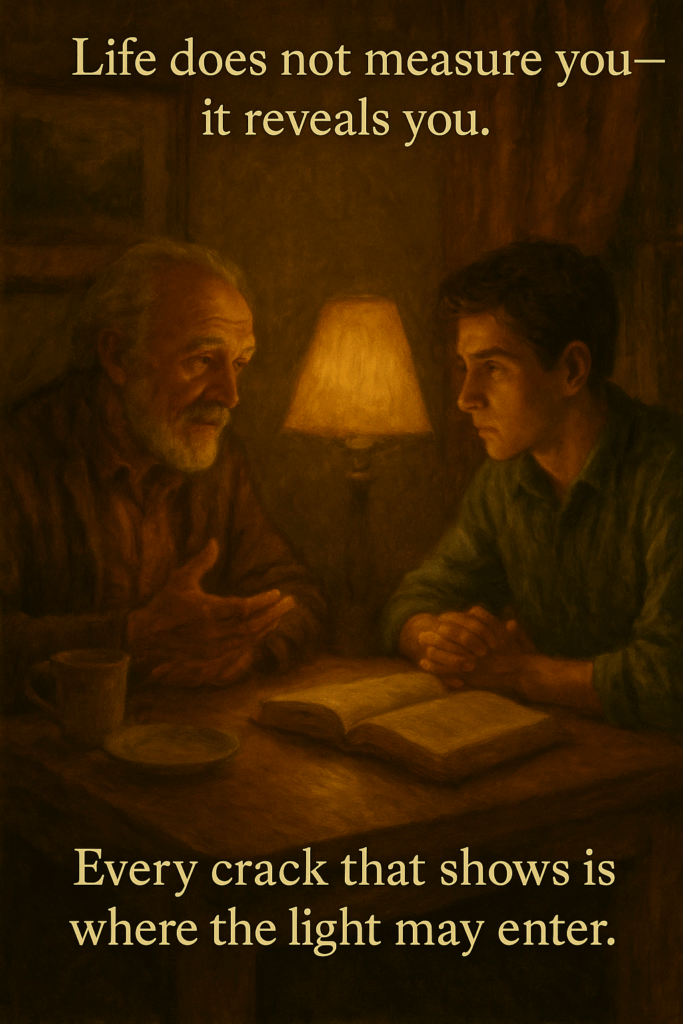
The kitchen smelled faintly of cardamom and woodsmoke. Dinner plates had been cleared away, leaving only the soft clink of teacups on saucers. Emil sat at the small table by the window, staring at the lamplight trembling against the glass. His hands were folded, not fidgeting, but still restless.
Grandfather settled opposite him, lowering himself slowly with the dignity of old bones. He poured tea, his gestures deliberate, his silence spacious.
Emil finally spoke.
“Why does it always feel like life is a test? Every moment here, every argument, every storm—it all feels like we’re being measured.”
Grandfather lifted his cup but did not drink. “It is not that you are measured, Emil. It is that life reveals you.”
Emil leaned forward, his voice low, confessional.
“I think about what you’ve said before—the tests:
- Power, when superiority tries to become law.
- Judgment, when fear tempts us to condemn instead of discern.
- Authority, when rules forget the people they were meant to serve.
- Leadership, when ego shouts louder than responsibility.
- Consciousness, when comfort lulls us into forgetting what matters.
And then… the four absences. Each one at the root of something broken in us.”
He rubbed his temples. “I don’t know how anyone passes them.”
Grandfather’s gaze softened, deep lines folding around his eyes. He set his cup down with a quiet tap.
“No one passes them all. That is not the point. A test is not always for passing—it is for showing you where the cracks are, so you know what must be mended.”
He leaned forward, his hand resting briefly on Emil’s.
“The absence of wisdom makes power cruel. The absence of values makes judgment blind. The absence of dignity makes authority corrupt. The absence of awareness makes leadership hollow. These absences will visit every person. They will visit you. But you are not asked to conquer them once and for all—you are asked to recognize them, and to choose differently, again and again.”
Emil swallowed hard, his eyes damp. “So… failing doesn’t end the story?”
Grandfather smiled, weary but luminous.
“No, child. Failing is how the story teaches. Pride fears failure. Wisdom welcomes it, because wisdom knows that every crack lets in light.”
Emil was quiet for a long moment. Then he said softly, “Lara learned that today, didn’t she? She thought her cleverness could shield her, but the seeds showed her otherwise.”
Grandfather nodded slowly, his eyes bright with approval.
“Yes. Her test was humility. To be corrected not by scolding, but by silence. To bow before the small truth of a single seed—that it will grow in its time, not by her command. That was her storm, and it softened her heart. Do not overlook this, Emil. Sometimes the greatest change is not in the strong who lead, but in the proud who learn to kneel.”
The lamp guttered slightly in the draft. Emil looked at the flame, then back to his grandfather. “And if I forget again?”
Grandfather chuckled softly. “Then I will remind you. And when I am gone, the soil, the storms, the natural disasters, the seeds—they will remind you. That is why we keep the greenhouse, why we till the earth: not because it needs us, but because we need it to remember ourselves.”
The room fell into a companionable silence. Emil closed his eyes for a moment, letting the words sink like roots into soil still shaken by storm. He felt, for the first time in days, that he could breathe without effort.
The ledger of the night remained unwritten, but the lesson was already inscribed—
Not in ink.
In memory.
In inheritance.

